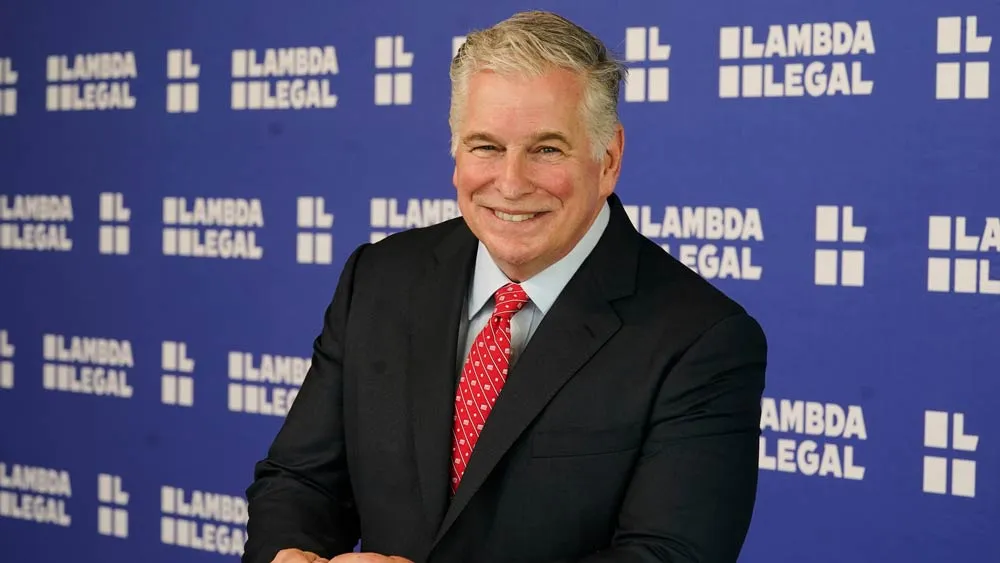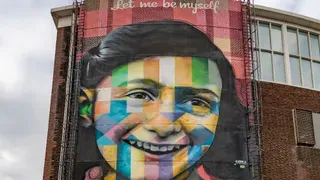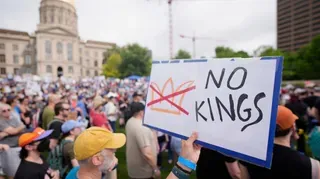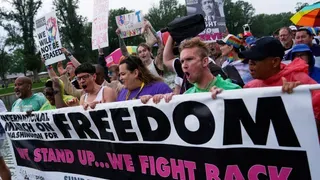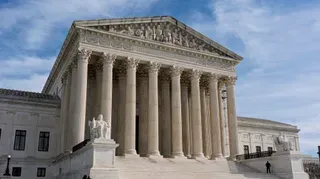May 11, 2012
The Harvey Milk Foundation: Nephew Carries Uncle's Legacy
Chris Sosa READ TIME: 6 MIN.
Until his now famous uncle's untimely assassination in 1978, Stuart Milk was a teenager who, though still closeted, had a unique connection with his uncle Harvey.
At the time, Harvey Milk was the first openly gay person elected to San Francisco's Board of Supervisors - and only the fifth openly gay person elected to public office in the nation. He was also one of the few people in the family that, despite knowing about his nephew's still private homosexuality, spoke to him about what it meant to be different and how difference could bring about positive change, despite the inherent challenges it presented.
Fast forward 22 years to 1999 and -- well before the 2008 blockbuster starring Sean Penn made Harvey Milk a household name -- Stuart Milk decided to pick up where his uncle had left off. It was then that he formed the Harvey Milk Foundation, a not for profit organization that, according to its website, aims not just to educate the world on the plight of the LGBT population, but takes this concept further extending it to any "gay, lesbian, bisexual, transgendered, racial and ethnic minorities..." with the goal of giving them the right of full societal involvement and recognition.
Now 13 years since its inception, the Harvey Milk Foundation continues to extend its message not just in the U.S., but throughout the world. As [Stuart] Milk exclaims, "It's not a U.S. or San Francisco problem. Hate and bigotry doesn't get stopped by a body of water or the Himalayas."
Milk, who worked a full time job in the private sector until recently, admits that "addressing the fact that hatred and oppression is not acceptable in any part of the world" is, and has been a full time job, since the foundation's beginnings. He takes no pay and is also far from short on frequent flyer miles.
"I've traveled to at least 50 countries and spoken with at least 200,000 people throughout the world," he says. "And we're making progress, but there is still so much to be done."
Speaking to the SFGN, Milk's magnetism is undeniable and his knowledge seemingly unending.
The gleam in his eyes, pupils wide with excitement as he speaks while sipping his Starbucks coffee, only affirms the words of Fort Lauderdale attorney Norm Kent who summed up Milk by stating, "The great thing about Stuart is that, despite so many people with iconic, deceased family members, Stuart actually took the chance to not just continue his uncle's message, but to take it to a whole new level rather than just letting it die out or become part of the history books."
And indeed, history plays an even deeper role in this story than Kent suggests.
When he decided to start the foundation in 1999, it was during the festivities for the Presidential Medal of Freedom Award. He was accepting the award - the highest civilian honor given for societal contribution -- on behalf of his uncle Harvey. And it was here that, as Milk recalls, a conversation with a fellow recipient led to the birth of what is now the HMF.
That fellow recipient was none other than Desmond Tutu, and his message to Milk was clear. "He challenged me to do more," Milk says, nonchalantly rehashing his conversation with the world-famous anti-apartheid figurehead and Nobel Peace Prize winner. Nonetheless, he got the point.
Milk immediately linked up with Anne Kronenburg, a long time Milk family friend and fellow activist who had worked for Harvey Milk's San Francisco campaign. There and then they decided to co-found the organization and the Harvey Milk Foundation (HMF) was officially started.
Since then, Milk hasn't looked back enduring a seemingly unending travel schedule and, admittedly putting himself in harm's way to work not only to change the future, but to speak about it through the lens of both the past and present, with education being at the forefront of the foundation's objectives.
Overseas, he travels to countries where he "has to look over his shoulder," advocating for unity amongst minorities of all types.
In 2011, according to the HMF Website, he joined Czech tennis star Martina Navratilova to successfully boycott the Czech government's banning of a national Czech PrideFest; in Hungary, Milk and supporters marched against thousands of Neo Nazi's in Budapest to help the LGBT community to show their Pride despite violent protest; in the Middle East, Milk has held talks in Istanbul and other countries - through their consulates or in person - to counter the region's brutality and "hate speech" directed at sexual and ethnic minorities. And this barely scratches the surface.
"In the past years, 4 LGBT centers have opened and been named after Harvey: two in Italy, one in Rotterdam and another in Barcelona, Spain," he says proudly. A fifth is scheduled to open this month (May) in Rome, Italy.
The breadth of his international work has spanned five continents and continues to grow in both popularity and demand. Reciting facts off the top of his head with ease, Milk speaks of his international work in almost macabre terms, the purpose, of course, being to raise awareness that while the HMF continues its work internationally, much of the world remains resistant to LGBT and minority recognition and rights.
"Being LGBT - gay in particular -- is still illegal in 77 countries, is punishable by death in 23 nations of which 14 actively enforce the death penalty for what they consider deviant sexual behavior and gender orientation," he says.
Meanwhile, here in the states, while it is not illegal to be LGBT, Milk recognizes that despite strides being made, there is still a "long way to go." He points specifically to the importance of education to reinforcing acceptance of sexual minorities as key to American progress in the fight for LGBT equality.
General Counsel for the HMF, Miriam Richter agrees, and states, " you can legislate all you want, but education is the only way we will ever get where we need to be."
Both Richter and Milk point to California as a model of where they believe the country should be headed with regards to LGBT rights and education. It is here that in 2009, a proposal known as SB 527 was signed in to law by then Governor Arnold Schwarzenegger, which declared May 22 "Harvey Milk Day."
While state offices are not closed for the holiday, it is on this day every year that schools are encouraged to place a particular emphasis on the teaching of LGBT history and the man who pushed for - and succeeded - in making LGBT people's lack of presence in politics a thing of the past.
In addition to "Milk Day," the foundation has also seen to it that The Harvey Milk Story - a children's book chronicling the life and times of Milk - become part of the day's traditions, helping furnishing copies to students and educators alike. California, meanwhile, didn't stop here.
Signed into law last year, California's SB 48, takes it a step further, adding to "Milk Day" with language that specifically identifies and includes the need for, the "study of the role and contributions of both men and women...lesbian, gay, bisexual, and transgender Americans...and members of other ethnic and cultural groups...with particular emphasis on portraying the role of these groups in contemporary society."
With a proud smile, Milk calls it what he believes to be "the leading LGBT educational program."
With the growth of the foundation, Milk now works as a consultant for his original full time job and oversees the HMF, which, he says, "is like having two full time jobs in itself."
As for those who find themselves still asking about the HMF or Stuart Milk in particular, they can feel free to visit the foundation's website listed below.
Considering the abundance and scope of his unending life's work, one thing seems somewhat certain: to call Milk a modern day "caped crusader" for the LGBT community may not be that much of a stretch.
Indeed, when a city, state, country or continent shines its light on inequality and injustice, Milk is there, with the help of his foundation, to make sure everyone is heard - much like his uncle - even if it involves putting himself in harm's way to make sure people of all minority groups have the opportunity to be recognized and treated as equals.
